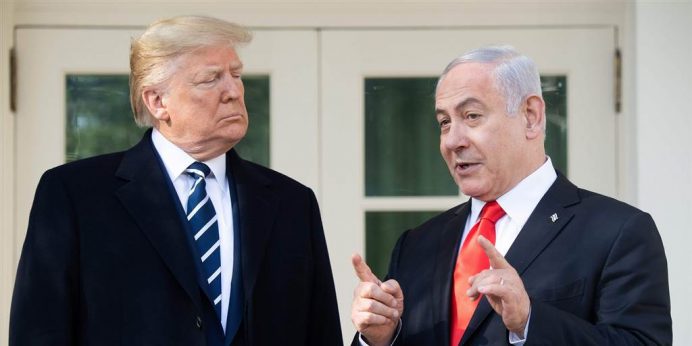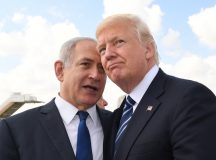In this insightful essay Ofer Zalzberg, Director of the Middle East Program at the Herbert C. Kelman Institute for Conflict Transformation, argues that despite being framed as the ‘most pro-Israeli president ever,’ President Donald Trump repeatedly disagreed with Prime Minister Benjamin Netanyahu over several matters of strategic importance for Israel. However, both governments chose to conceal these differences, and that could have major repercussions for Israel in the long-term.
Prime Minister Benjamin Netanyahu characterised Donald Trump as ‘the most pro-Israeli president ever’, claiming there was ‘zero daylight’ between Washington and Jerusalem. Indeed, several Trump policies favoured Israeli interests as understood by the two administrations. The salience of those symbolic policies, however, hid core strategic disagreements between the two governments during the Trump era. Yet, for reasons detailed below, both sides decided to keep those disagreements away from the public’s eye. This choice has placed major constraints on Israel’s ability to contest those US policies toward the Middle East which it deemed detrimental.
Setting aside whatever subjective criteria one might use to define a ‘pro-Israeli’ stance, and examining instead the actual divergences between two sides, one sees that the unequivocal pro-Israeli depiction of the Trump administration omits significant harm that US policy inflicted to Israeli interests (as Israel’s own democratically elected government defined them), particularly over Iran policy and Arab-Israeli relations. This article is anchored chiefly in Netanyahu’s understanding of a ‘pro-Israeli’ stance, not my own.
Trump and Israel: The Standard Narrative
There are three main sets of policies for which the Trump administration is lauded as pro-Israeli: countering Iran, advancing Arab-Israeli relations and advancing Israel’s interests vis-à-vis the Israeli-Palestinian conflict. On Iran, the Trump administration withdrew from the 2015 nuclear deal (the Joint Comprehensive Plan of Action, or JCPOA) and subsequently deployed extensive coercive diplomacy toward Israel’s enemies in Tehran through economic sanctions and terror designations. President Trump also ordered the assassination of Iran’s Islamic Revolutionary Guard Corps (IRGC) leader Qassem Soleimani and stood in support of Israel’s own military efforts against Iranian entrenchment in Syria. In his first trip to the Middle East, President Trump declared who the US deems to be the good and bad guys in the Middle East, placing Israel firmly in the former. Seeking to advance Arab-Israeli rapprochement, the administration worked to tighten the relations between members of this purported ‘good guys’ camp, an effort which peaked with the normalisation agreements between Israel, the United Arab Emirates (UAE), Bahrain, Sudan and Morocco, with a blessing from the Kingdom of Saudi Arabia behind the scenes.
President Trump also extended US recognition of Israeli sovereignty over East Jerusalem and the Golan Heights, and deemed Israeli settlements as not inconsistent with international law, conferring lone, but unprecedented recognition of Israeli’s rule over, and actions in, territories it acquired in 1967. His administration worked to remould the paradigm for resolving the Israeli-Palestinian conflict, by publishing a plan (‘Peace to Prosperity’) that was more generous to Israel in its proposed distribution of material resources than any previous plan. The plan envisaged a highly constricted, dis-contiguous Palestinian state, surrounded by Israeli-sovereign territory; conditioned its emergence on far-reaching and burdensome criteria; and embraced an Israeli narrative of the conflict. The Trump administration sought to compel Palestinian acceptance of the plan by applying coercive measures toward the Palestine Liberation Organisation (PLO), primarily through ending US funding to the Palestinian Authority (PA) and to Palestinian society (USAID in the West Bank and Gaza, UNRWA). It also threatened the International Criminal Court (ICC) with sanctions if it were to act against Israel’s conduct in the Israeli-Palestinian context.
The obvious preference for Israel reflected by these policies was underlined by the contrast between President Barak Obama and President Trump. Obama conspicuously clashed with Netanyahu over an Iran policy the latter defined as an ‘existential threat’ to Israel, as well as over a West Bank policy which Netanyahu framed as countering security interests and denying Jewish history. In contrast, Trump and Netanyahu presented an image of unbridled support for Israel through seemingly highly cooperative US-Israeli relationship on both Iran and the Israeli-Palestinian conflict. The further US-Iran and US-PLO relations deteriorated, the tighter US-Israel relations seemed. This ‘no daylight’ framing was partly embraced for electoral gain – for Trump mostly among US Evangelicals who believe in supporting the Jewish people, and for Netanyahu particularly among Israelis who are deeply committed to Israeli rule over the entire Jewish homeland.
However, from the perspective of Israel’s own Prime Minister and that of many in his government, the Trump record is mixed. From Netanyahu’s perspective, the Trump administration’s policies hurt Israeli interests in these very same three areas. Indeed, to the extent that one shares Netanyahu’s view that countering Iran’s nuclear and regional advances is Israel’s primary concern, Trump’s policies overall caused Israel more harm than good.
Failing to Counter Iran
The Trump administration’s decision to accelerate the withdrawal of US military presence from the Middle East harmed Israeli security interests. Trump repeatedly prioritised conspicuous and rapid US withdrawal over repeated Israeli requests to the contrary.
Strengthening Iran in Syria
First, in the midst of the war in Syria, as Israel secretly backed southern Syrian rebels, Trump terminated US overt and covert support to Syrian rebels, catalysing Syrian President Bashar Assad’s takeover of southern Syria. Consequently, IRGC, Hezbollah and other Shia militias have since been entrenching themselves and establishing offensive infrastructure in proximity to Israeli localities in the Golan Heights and the Galilee. Israel’s requests to reconsider the termination of US support to rebels, communicated in multiple channels, including to President Trump himself, were to no avail.
Later, during Trump’s last few months, with Assad clearly having the upper hand thanks to Iranian and Russian support, the Trump administration rejected Israel’s initiative to offset some Iranian gains in Syria caused by US pull-outs. Israel requested that the US facilitate a transaction consisting of investments by Gulf countries in Syria in exchange for a renewal of Gulf-Syrian diplomatic relations and Syria’s return into the Arab League. Israel saw in this a path to reduce Iran’s influence in Syria by diluting it with Gulf influence. The request was shot down by mid-level administration officials who dogmatically maintained that Syria merits only sanctions because of its alignment with Iran. The US, therefore, rejected an Israeli proposal aimed precisely at reducing Damascus’s dependence on Iran. The Trump administration also rejected repeated Israeli requests to end US support for the Lebanese Armed Forces, which the Israeli government deems to be a detrimental façade for Hezbollah’s rule over the country.
Incoherent regional pull-outs
Second, and more broadly, Trump made several loud announcements of withdrawals and implemented a series of US troop pull-outs from both Syria and Iraq. To the chagrin of Israel’s defence establishment and prime minister, the sizable reduction in support for Kurdish forces gave the impression that the US betrays its allies, even those who fight shoulder to shoulder with it. More generally, the flamboyant withdrawals undermined the perception of American power in the Middle East by enhancing the impression that the US is only looking for an easy end to so-called ‘endless wars’, and thus any adversary exercising patience can overcome US power. Even when the US back-pedalled somewhat – among other reasons as a result of Israeli pressure – it failed to significantly offset losses, both in terms of actual troop deployment and of regional perceptions of the US. In Iraq, domestic pressures for US withdrawal have thus increased, also as a result of Soleimani’s killing in Baghdad. And most palpably, Israel’s leadership was disappointed with the lack of forcible US reaction against Iran to the September 2019 attack on Saudi Arabia’s oil processing facilities.
The Trump administration nourished another sort of vacuum which proved counterproductive for Israel. US sanctions policy toward Syria, embodied in the Caesar Act, weakened Syria’s economy just when Damascus’s dependence on Iran reached unprecedented highs, denying the Syrian government access to its own oil fields, effectively increasing Iran’s influence over the Syrian regime. Indeed, Iran seized upon Syria’s economic fragility and its military weakness versus Islamic State (IS) and pro-Turkish militias as an opportunity to increase Assad’s dependence on Iranian oil and on IRGC forces and Iran-backed Shia militias. For similar reasons, Trump’s unconditioned support for Saudi Arabia’s campaign in Yemen and its consequent harm to the horizon for ending the war diplomatically, only increased Houthi dependence on Iran.
Refusing to produce a credible military threat
Third, Trump’s rejection of Israel’s request for a credible US military threat to Iran has been disastrous from Netanyahu’s perspective. The so-called ‘maximum pressure’ strategy failed to achieve an Iranian policy shift on the nuclear front despite the accumulated economic strain on Iran, because a serious military threat was absent. Trump, war averse, overruled National Security Adviser John Bolton, ultimately framing the US as deploying economic pressures while delegating actual fighting to regional powers. Iran knew that these same regional powers wanted the US to do the heavy military lifting. As a result, per Netanyahu, the leadership in Tehran was not convinced it needs to accept a new nuclear deal that essentially prohibits any kind of enrichment in Iran.
Worse yet, the failed exercise of coercive diplomacy has cost Israel losses in terms of JCPOA’s caps on Iranian nuclear enrichment, which Tehran ultimately felt free to ignore. Trump’s withdrawal from the JCPOA also came at a great cost for US credibility, leaving stakeholders worldwide less willing to rely on US guarantees. If past is precedent, this will prove to be a major loss for the closest US allies, who are the most likely beneficiaries of its power. For instance, the US was able to broker the Israeli-Egyptian peace treaty, in part, because Egypt and Israel believed US guarantees and commitments would persist for long decades, withstanding changes in the identity of the White House occupant. When President Trump exited the JCPOA, he severely damaged the expectation that the US will honour its long-term commitments.
Fragmenting Iran’s foes
Fourth, Trump’s policies fragmented Iran’s regional adversaries, particularly by deepening the divide between Gulf countries. Just when the US exercised pressure on Tehran to compel it to take certain steps, it punctured the coalition of its regional adversaries, particularly in Ankara and Doha, which Iran ably exploited. The Arab Quartet’s blockade on Qatar commenced immediately after Trump greenlighted it during his first Middle East visit. This dramatically harmed Gulf Cooperation Council (GCC) cohesiveness and coordination regarding Iran’s activities in the Gulf and across the Middle East, swinging Qatar toward Iran, deepening Doha’s dependence on Iran while generating a new source of revenue for Tehran (diplomats estimate that Qatar has been paying Iran €100 million annually in air travel fees alone).
Trump also failed to draw Turkey toward Israel and its partners. Rather than facilitating Turkish-Israeli coordination on common interests in Syria, Turkey became a pillar of the Astana Forum, along with Russia and Iran. Consequently, crucial decisions regarding a war in a hostile country adjacent to Israel were being taken exclusively by Ankara, Moscow and Tehran, lacking any meaningful US inputs. All three of these have been either ambivalent or hostile to Israeli interests in Syria. The Trump administration also neglected Israeli-Turkish bi-lateral relations. Trump’s recognition of Jerusalem as Israel’s capital was followed by Turkey’s withdrawal of its ambassador from Israel and loud actions in the Organisation of Islamic Cooperation (OIC). As has been the case in Turkish-Israeli relations for decades, well before President Recep Tayyip Erdogan came to power, the relationship between the two countries deteriorated as the crisis in Israeli-Palestinian relations grew. Erdogan began signalling interest in rectifying Turkish-Israeli relations during the last month of Trump’s term, only after President Joe Biden was elected, hoping proximity to Israel would help him overcome criticisms from a new, more demanding administration. Netanyahu and other Israeli leaders were repeatedly disappointed with Trump’s forgiving conduct toward Erdogan’s policies, particularly in the Eastern Mediterranean.
During the last month of Trump’s term, his administration did play a role in ending the boycott on Qatar – though, again, the looming clash with the incoming Biden administration likely played an even bigger role in Riyadh’s motivations. Given the vague nature of the understandings Qatar and its adversaries have reached, which have been publicised as a declaration of general principles rather than a contractual agreement with specific commitments, it is premature to say whether this reconciliation would prove to be a decisive step on the path to greater Sunni coherence against Iranian threats or a modest, perhaps even fleeting, lowering of tensions. One can already say that during Trump’s years such coherence was absent, that Israeli interests consequently suffered and that much of this fragmentation likely would not have happened if Trump would not have greenlighted the boycott over Qatar from the outset.
In sum, from Netanyahu’s perspective, Israel preferred that the US stayed present in the region, willing to engage militarily against Iran, offer robust support for elements of the Syrian opposition (particularly the Kurdish and southern rebels), and to consolidate, not fragment, Iran’s regional adversaries. Instead, Trump failed to convince Iran of his willingness to use military force, accelerated jumbled American withdrawal processes from the Middle East and crassly sanctioned Syria in ways favourable to Iran’s influence in the country.
Expanding Arab-Israeli Relations
The normalisation agreements, certainly among the most important pro-Israeli feats of the Trump administration, reflect another US-Israeli disagreement in which the US position prevailed. The agreements between Israel and the Arab countries were a consolation prize – a face-saving device the White House and Abu Dhabi designed for Netanyahu without his full knowledge, after Trump and his senior adviser Jared Kushner chose to overrule the preference of Netanyahu (and the US Ambassador to Israel David Friedman) for both West Bank annexation and Israeli-Arab normalisation. In case the two were mutually exclusive, Netanyahu preferred annexation. The White House overruled the Israeli Prime Minister.
Impact on Jordan and Egypt ignored
Israel’s normalisation with Gulf states came at the expense of Jordan and Egypt and of their relations with Israel. Differently put, Trump advanced Israel’s relations with certain Arab states while setting back Israel’s relations with other Arab states. This occurred in spite of the paramount strategic importance of Egypt and Jordan for Israeli security, not least by virtue of providing for Israel significant strategic depth to the south and the east, virtually free of hostile forces, because of these important relationships.
Jordan and Egypt, which used to liaise between Gulf states and Israel, have lost this rare political and economic advantage. Moreover, Jordan’s position as a regional hub for US firms was downgraded. Egypt lost its near monopoly on export traffic from the Red Sea to Europe via the Suez Canal, which is Egypt’s last lucrative source of revenue after tourism faltered due to fears from terrorist attacks. The Israel-UAE agreement included an arrangement allowing export commodities to pass from the Red Sea to Europe through a land corridor in Israeli territory, as an alternative to the Suez Canal. The Trump administration failed to weave Jordan and Egypt into its Israel-Gulf normalisation strategy, making them part of these new relationships. Worse, it did not put in place any complementary policies in order to compensate Amman and Cairo for their losses.
Sale of F-35s to UAE harms Israel’s military edge
For Netanyahu, the normalisation agreements provide significant benefits for Israel, but they come at very high costs: direct and indirect, presently and in the future. Two particular costs are key. The first is the US sale of F-35s and advanced drones to the UAE. These would not have been a problem had it been possible to keep them a singular exception in the region, but they ultimately will harm Israel’s qualitative military edge (QME). The UAE has a stable government and there is no reason to think that it would use such weapons against Israel. However, this transaction is likely to trigger a regional arms race. Indeed, the reason both Republican and Democratic administrations had zealously stuck to the status quo QME is that once the US sells such advanced weaponry to Middle Eastern states other than Israel, it would become impossible to convince Russia and China not to sell similar weapons to Iran and its allies – or to Egypt and Saudi Arabia. Moreover, the US itself would find it virtually impossible not to sell the same weaponry to other Middle Eastern allies, like Saudi Arabia and Qatar. Trump advanced Arab-Israeli agreements at the high cost of significantly destabilising the status quo, QME-balance that had prevailed for decades.
Making Israel endorse US recognition policy may have a price down the road
The second cost is the increased risk that other countries will act without Israeli consent to realise their desired outcomes for conflicts involving Israel, now that Israel has done so in conflicts affecting others. Israel traditionally took care not to take such actions, avoiding formal positions regarding Crimea, Nagorno-Karabakh, etc. For Netanyahu, the Trump administration’s recognition of Jerusalem as Israel’s capital and of Israeli rule over the Golan Heights were unilateral acts which the US took of its own volition, not due to Israel’s encouragement. In contrast, pressure from Washington led Israel both to tacitly endorse US recognition of Moroccan rule over the Western Sahara as part of a US-Israel-Morocco agreement, and to formally recognise Kosovo as a state.
Whether Bolton is correct that the US could have brokered Morocco-Israel normalisation without recognising Morocco’s rule over the Western Sahara is impossible to determine, but Trump’s eagerness to cut these deals urgently, no matter the medium and long-term consequences, led Netanyahu to accept precedents which Israel may well regret in the future. Israel is likely to find it even harder to prevent other countries from taking positions regarding the Israeli-Palestinian conflict in a manner prejudging final-status negotiations, notably through recognition of Palestinian statehood. Beyond these two matters, these generous rewards for Arab states have set extremely high-bar precedents for future normalisation agreements. Arab countries now perceive that even gradual, partial normalisation – which in Morocco’s case mostly restores pre-existing relations – would merit a huge reward from the US, even if it requires a dramatic departure from international norms or eroding the primacy of Israel’s security.
Alienating Arab publics
The normalisation agreements were designed and brokered in ways which made them even less popular among Arab publics than they could have been. Their crass transactional nature gave many Arab observers a sense that the US not only disregarded the Palestinian people, who Arabs habitually view as Israel’s victims, but also disdainfully handled all parties in the Middle East and their respective interests as commodities. It is premature to assess the medium term impact of these unpopular normalisation agreements. Yet, Israel’s Strategic Affairs Ministry conducted research immediately after the signing of the agreements with Gulf countries and found that 95 per cent of the reactions on Arab Social networks were negative. Moreover, one can already point to the added pressure this brought on Bahrain’s Sunni minority from its Shia majority and on Sudan’s fragile government from Islamist parties. Unlike Trump and Netanyahu’s rhetoric, suggesting wholehearted acceptance of Israel’s legitimacy in the Middle East by the publics in the Arab normalising countries, the normalisation agreements mostly reflect a more superficial pragmatic and transactional logic on the part of the governments of these countries.
The Israeli-Palestinian Conflict
Because of the deep ideological disagreement in Israel regarding the future of the Israeli-Palestinian conflict, views of pro-Israeliness toward the conflict vary. Sticking to the Israeli government’s approach, the overlaps and divergence between Trump’s policies and Israel’s are sharp. Netanyahu and Trump’s team largely saw eye to eye in regard to the substance of Trump’s Peace to Prosperity plan. Trump’s advisers certainly consulted very closely with Netanyahu and his team. This allowed Netanyahu to announce his principled acceptance of the plan as a basis for negotiations, supposedly placing the onus on the PLO to embrace Trump’s framework. In addition, the Trump administration’s recognition of Jerusalem as Israel’s capital, of Israeli rule over the Golan Heights and of the non-illegality of settlements were deeply appreciated by Netanyahu.
The major divergence pertained to Israel’s wishes to swiftly annex the areas the plan accorded to it. Indeed, soon after Trump announced the plan, Netanyahu and his team indicated their intention to imminently annex parts of the West Bank. However, Trump’s senior advisers prevented this step, fearing it would jeopardise their plans for advancing Israeli-Arab relations and apprehensive about Netanyahu’s limited domestic support for expansive annexation. Expressing a position shared by most Israelis, Blue and White leaders opposed this territorially expansive nature, objecting to stretching annexation beyond the so-called settlement blocs that are located in close proximity to the 1967 line, as Netanyahu advocated, for fear that it would foreclose the possibility of future political separation between the two peoples. The Yesha Council, an umbrella organisation of municipal councils of Jewish settlements in the West Bank, and other pro-settler groups opposed annexation because it required principled support for Trump’s plan, which called for a constricted Palestinian state, thus violating religious prohibitions and, to their thinking, endangering Israel’s security.
Conclusion
Trump and Netanyahu chose to conceal their differences. That is the main reason that most observers missed them. The ‘bear hug’ that the Trump administration gave Israel, mostly on certain highly symbolic issues, as well as the political-electoral alliance between Trump and Netanyahu, meant that the Trump administration’s unfavourable policies toward Israel were not acknowledged, and therefore not publicly challenged by Israel. In light of the big symbolic wins, it generally seemed impossible for other Israeli ministers to Netanyahu’s left, notably Defence Minister Benny Gantz and Foreign Minister Gabi Ashkenazi, and even for opposition leader Yair Lapid, to challenge Trump’s policies. This was true even when they thought the overall cost-benefit calculation for Israel, certainly at the strategic level, was negative.
The symbolic acts regarding Israel’s 1967 territorial gains convinced Israelis that Trump was adamantly pro-Israeli. However, like all US presidents, he naturally prioritised US interests, as he saw them, over Israeli ones. In fact, on some regional strategic issues he disregarded Israeli interests more than many of his predecessors. But unlike previous presidents, this time Israeli leaders felt unable to voice their disagreements – fearing both to anger him, lest he become ungenerous on other fronts, and wary of the costs in Israeli public opinion of challenging a president who on certain highly symbolic issues was unprecedentedly favourable to Israel.
Trump and Netanyahu decided to create a semblance of intimate, unprecedented cooperation, centred around unmatched policies toward the Israeli-Palestinian conflict. Netanyahu might believe that overall Israel is better off given these particular gains despite the sizable above mentioned harm. However, his strategic policy disagreements with Trump behind the scenes over the last four years clearly reflect a sense that they came at a high cost, above all regarding his paramount priority of countering Iran. The semblance of unbounded friendship severely limited Israel’s ability to challenge US policies toward the Middle East regarding matters of cardinal strategic importance for Israel. With Trump no longer in office, the harm caused during these years can now be fully acknowledged and addressed.





































Mr. Zalzberg’s analysis is correct if evaluated in a vacuum. President Trump ran and most likely got elected on a razor’s edge mainly because of his isolationist base to which no other Republican candidate was willing to address seriously. Trump gave Israel a choice. Take his” goodies”, which were definitely goodies for a fait accompli(if he was ever to get elected again) of a much smaller involvement in the Middle East or just deal with it without the “goodies”. I don’t think President Biden will be so generous as to be handing out “goodies” to Israel, especially to BIbi, so at least with President Trump there was significant consideration in regards to a greater isolationist role his constituency demanded.
Spinning every event to the negative is irresponsible analysis by Mr. Zalberg. The US-Israel alliance under Trump did far more collective bilateral good than any US administration since the re-establishment of the Jewish state.
And one event that really stung went omitted: Trump’s veto of 30 year-old Israeli F-14 jets to Croatia. It torpedoed a half-billion dollar transaction with no articulated threat to US interests.